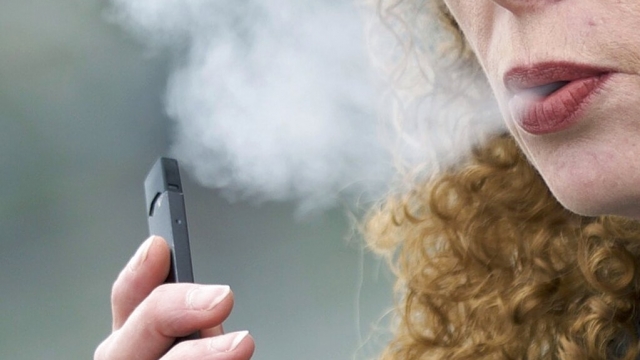For most of our nation's history, cigarettes were central to cultural life. Movie stars and famous doctors smoked; cigarette ads were pervasive on television; and in the 1960s, 4 in 10 American adults smoked.
And while the number of cigarette smokers has gone down, government regulation has been relatively limited until last year, when the Biden administration signaled it would regulate cigarette nicotine levels.
Yet it's only the latest chapter in the story of government involvement in the tobacco industry.
In 1964, 4 in 10 American adults smoked, according to Gallup.
That year, U.S. surgeon general Luther Terry released the first government report linking smoking and cancer.
"Cigarette smoking contributes substantially to mortality from certain specific diseases and to the overall death rate," said Terry at the time.
Then, in 1990, Congress banned smoking on domestic flights lasting six hours or less. "We're talking about the public transportation facilities here," said former Georgia congressman Newt Gingrich at the time. "And whether or not in those public facilities, nonsmokers and employees should be involuntarily condemned to endure the potential increase of lung cancer and heart disease."
But it wasn't until 2009 that Congress gave the Food and Drug Administration authority to regulate cigarettes.
"Forty-six million Americans are still hooked. The fact is, quitting smoking is hard. Believe me, I know," said President Obama in 2011.
And in 2016, the FDA asserted authority to regulate any product with nicotine, including e-cigarettes.
That category includes disposable and rechargeable vape pens, like those sold by Juul.
Today, only 12% of American adults report smoking cigarettes, down from a high of 45% in 1954. And while e-cigarettes make up less than 3% of tobacco revenues, they are one of the fastest-growing segments in the market, including among teenagers. More than 2.5 million middle and high school students reported using e-cigarettes in 2022, according to the FDA.
"We are quite concerned about the rise in nicotine-containing e-cigarette use among youth, which is really epidemic," said the Centers for Disease Control and Prevention's Anne Schuchat in congressional testimony in 2019.
SEE MORE: What role will heated tobacco products have if there is a menthol ban?
Juul and other e-cigarette companies say they're helping smokers quit. In his congressional testimony, James Monsees, co-founder of Juul, said his company was "proud of the progress we've made towards that goal. We never wanted any non-nicotine users, and certainly nobody underage should ever use Juul products."
But critics say the company's previous flavors, which were discontinued in 2018 and 2019, were both targeted and appealing to kids.
Stacey Gagosian, vice president of public policy at the Truth Initiative, says the FDA is having to "balance what might be a helpful product for adults" with the risk of hooking an entire new generation to nicotine.
Critics say the risk for underage users outweighs the possible benefits for adults trying to quit.
"According to the National Poison Data System, we know that there has been an increase in recent years of incidents in which children have been harmed by exposure to e-cigarettes and e-liquids," said Meredith Berkman, co-founder of Parents Against Vaping E-Cigarettes. "In 2023 alone, since the end of March, there have been almost 2000 cases."
The FDA has cracked down and barred the sale of all e-cigarettes in flavors other than menthol.
The vaping industry, meanwhile, has submitted more than a million applications for new e-cigarettes. But the FDA has approved only 23. The government is also targeting traditional cigarettes.
Currently, menthol is the only flavor allowed in cigarettes as a defining flavor. And so there's currently a proposed product standard rule that would not allow that and remove menthol cigarettes from the market.
And last year, the White House announced perhaps the boldest step of all—a new rule that would drastically reduce the level of nicotine in cigarettes, presumably making them far less appealing to smokers and less addictive.
"This is really important because nicotine is, of course, what causes people to smoke and keeps them smoking, despite the fact that most people know that smoking is really not a good thing for your health," says Gagosian with the Truth Initiative. "And so by reducing the nicotine to a non-addictive level, the idea is that you're taking away the reason that people keep coming back to cigarettes. And this could really have a significant impact on public health."
Others feel that essentially removing nicotine from cigarettes would be both wrong and, ultimately, ineffective public policy.
"It's difficult not to see this as a 21st-century 'prohibition.' We know it didn't work for alcohol, so why does this administration think banning nicotine in cigarettes will be different?" wrote a former ATF agent recently in The Hill.
The rule was expected in May, but the White House declined to say when it would be released.
A previous version of this story misspelled Stacey Gagosian's name. It has been corrected.
Trending stories at Scrippsnews.com



